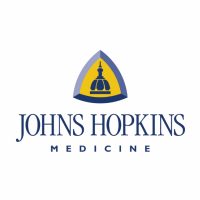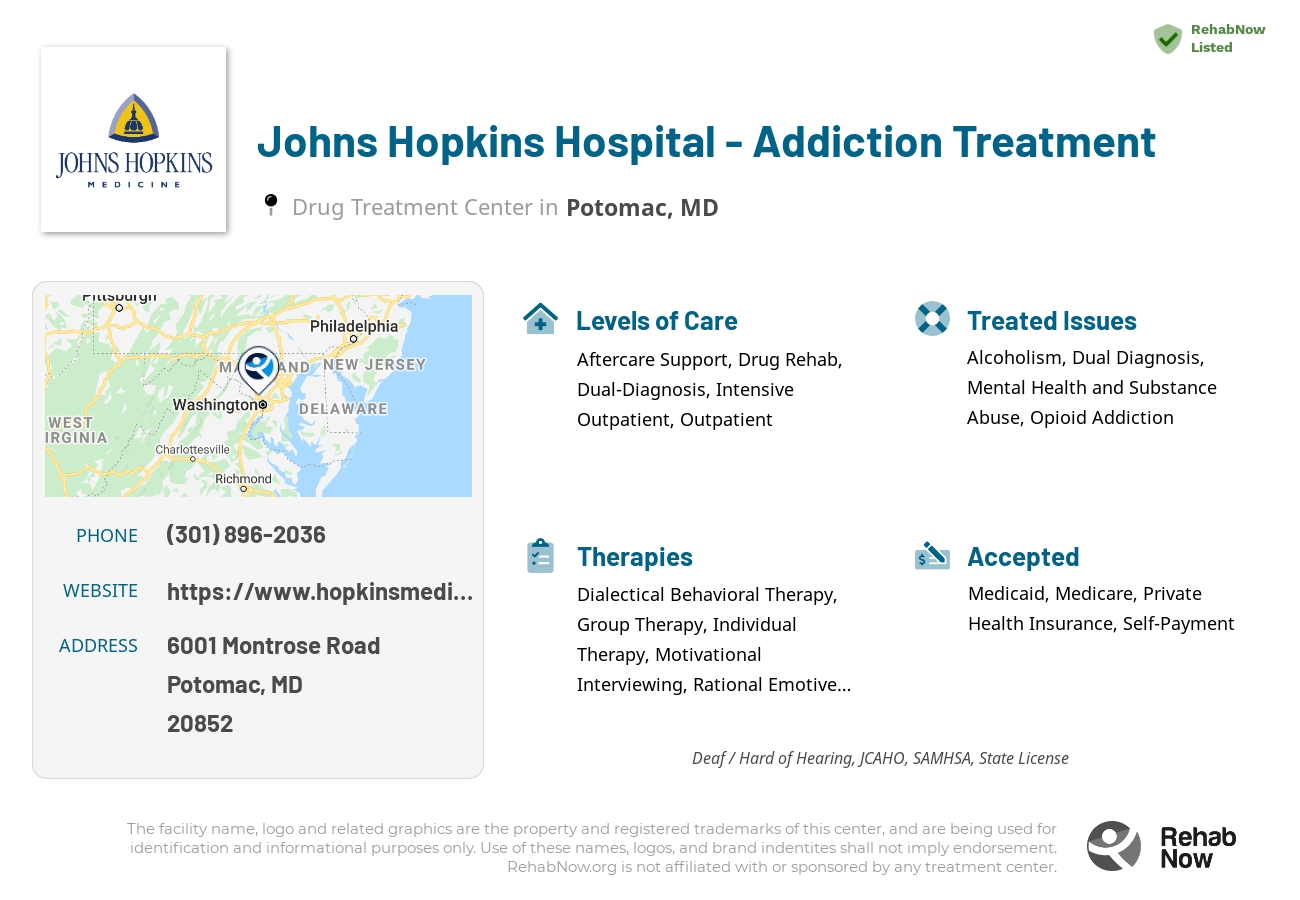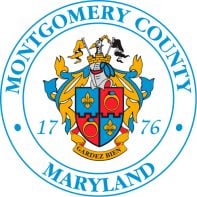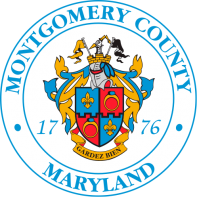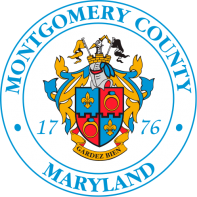Johns Hopkins Hospital - Addiction Treatment
Drug Rehab Center in Potomac, Maryland
Johns Hopkins Hospital Addiction Treatment program offers comprehensive services for substance abuse and addiction, including aftercare support, drug rehabilitation, dual-diagnosis treatment, intensive outpatient programs, and outpatient treatment, using evidence-based therapies and techniques to help patients achieve lasting sobriety and optimal mental health.
About Johns Hopkins Hospital - Addiction Treatment in Maryland
The Johns Hopkins Hospital Addiction Treatment program is a comprehensive, full-service treatment program for individuals dealing with substance abuse and addiction. Based in Potomac, Maryland, the hospital offers a wide range of services and treatments to ensure that each patient's individual needs are met. This includes aftercare support, drug rehabilitation, dual-diagnosis treatment, intensive outpatient programs, and outpatient treatment. The hospital is renowned for its highly skilled team, which specializes in helping to treat alcohol abuse, dual-diagnosis (co-occuring disorders), and opioid addiction.
The team offers a variety of evidence-based therapies and techniques to help patients cope with their addiction and mental health issues. These include dialectical behavioral therapy (DBT), group therapy, individual therapy, motivational interviewing, rational emotive behavior therapy, trauma therapy, cognitive behavioral treatment, and residential long-term care. Johns Hopkins Hospital Addiction Treatment is JCAHO, SAMHSA, and state-licensed, and accepts private health insurance. The hospital's mission is to provide each patient a safe and effective treatment experience that will help them achieve lasting sobriety and optimal mental health.
Genders
Ages
Modality
Additional
Accreditations
State License
SAMHSA

JCAHO
Conditions and Issues Treated
With so many people addicted to opioids, we need to help those who want to quit. The cycle begins when opioid addicts take opioids for a painful injury. When someone starts taking their medication differently or in excess, it means they’re addicted and at risk of overdosing.
In , detoxing from these types of treatments is the most effective way to beat this. Most facilities begin with medical assistance and then provide counseling services; rehabilitation follows after successful treatment.
Dual diagnosis refers to someone who has both an addiction and a mental or emotional illness. Dual diagnosis treatment includes therapy for both issues simultaneously, allowing for effective treatment of either.
Sometimes people with addiction disorders also have co-occurring disorders like depression, anxiety, bipolar disorder, etc. These require specialized treatment programs that address both drug and alcohol addiction as well as psychiatric illnesses. Some rehabilitation facilities provide patients with co-occurring disorders a program with highly integrated services and a clean, distraction-free environment.
Levels of Care Offered
This center offers a variety of custom treatment tailored to individual recovery. Currently available are Aftercare Support, Drug Rehab, Dual-Diagnosis, Intensive Outpatient, Outpatient, with additional therapies available as listed below.
An intensive outpatient program (IOP) is effective for drug rehab, but it can take six months to several years to complete. It’s the most popular type of drug rehab program in the United States. One example of a successful IOP success story is actor and comedian Chris Rock, sober since 1990.
An IOP allows participants to spend nights at home while attending meetings throughout the day. It’s a good way for drug addicts to make a recovery plan in an outpatient setting while still supporting their loved ones.
Alcohol or drug addiction, or co-occurring disorders, are treated in an outpatient program. The patient must attend therapy and other programs at the facility but can return home each night.
Outpatient treatment allows recovering addicts to live at home while receiving addiction treatment. Outpatients can attend group sessions for a few hours per week. Outpatients may also continue to work full time and study/attend school without interruption if they choose.
The accomplishment of completing a drug or alcohol treatment program is just the first step. Once that is complete, aftercare support comes into play. This includes helping people adjust to life without substances outside of guidelines with assistance like getting sober living accommodations and career counseling and AA/NA programs for those who are struggling between sobriety or want continued help in maintaining it once they have completed their initial rehabilitation at an addiction facility.
Aftercare comprises services that help recovering addicts readjust to normal day-to-day activities while working on specific issues. These problems include psychiatric issues, family problems caused by substance abuse, continuing education pursuits if desired during rehab, etc. These can last up to one year+ depending on what’s needed most urgently upon completion of earlier stages.
Therapies & Programs
Different people react differently to various treatment options. Some drug rehabilitation centers offer individualized treatment that caters to the specific needs of a drug addict. The best treatment option varies on an individual depending on the type of drug abused, life history, medical condition of the person, social circumstances, and the environment they live in now.
When a person enters drug rehab, they usually have anti-drug associations such as withdrawal symptoms, stress, cravings, etc. The first step of drug rehab is to detoxify the body from any residual substances in it. Drug rehabilitation centers usually employ trained medical professionals to help in this process. Usually, the initial detoxification lasts for five days, where the person is monitored under close supervision.
Attending group therapy at Johns Hopkins Hospital - Addiction Treatment in , is a useful way for those seeking sobriety to realize they aren’t the only one going through it.
This is when a group of people on different recovery phases get together and talk about what they’re going through, their triggers, successes, and failures. This can include alternative types of therapies too! Group therapy may occur on an outpatient or inpatient basis with groups that have no pre-existing relationships outside the session, unlike support groups where everyone already knows each other beforehand.
Trauma therapy is a form of therapy used to help people process and understand past traumas. This can help struggling addicts, as many people turn to drugs or alcohol to mask the pain of their past. Trauma therapy can be done in several ways, such as through visualization, discussion, and writing down thoughts and feelings. The goal is to help the individual understand why they are having problems coping with certain situations and changing how they think and react to things. This is often done in tandem with other therapies to treat the underlying issues associated with addiction.
The idea behind trauma therapy is that while some people can experience traumatic events and not have lasting psychiatric symptoms, many others will. In these cases, memories get hidden from consciousness but continue to influence how the person processes and copes with things in their life. They may avoid situations that resemble what happened or become suddenly angry or irritated to a situation that reminds them of a past event. With the help of a therapist, people can go back over memories and experiences. This helps them understand why they are having problems coping with certain situations and changing how they think and react to things.
This type of cognitive-behavioral therapy helps people understand how their thoughts, behaviors, and feelings are interconnected. It can help patients with borderline personality disorder gain control over their actions and stop self-harming thoughts and attempts.
Cognitive Behavioral Therapy is a type of psychotherapy that helps people address the thoughts and behaviors that may have led to their addiction. It also helps change negative thoughts into positive ones and promotes healthy communication between addicts and those around them. CBT is an efficient treatment for individuals suffering from all sorts of addictions.
Cognitive Behavioral Therapy (CBT) focuses on the underlying thoughts and behaviors that caused the problem of addiction in the first place and may cause a relapse. Negative feelings are common in drug abuse disorders, but they can lead to co-occurring disorders if not recognized. CBT involves strategies that help to change the behavior pattern by restructuring negative thoughts into positive ones. It helps to remove these feelings, and it provides long-term benefits. Also, CBT promotes self-awareness, self-control and can be administered as a mono-therapy or as part of combination therapy.
The use of Rational Emotional Behavior Therapy for addicts has been shown to have positive and desirable outcomes. It is a form of specific counseling that replaces negative and self-limiting thoughts with positive and productive behaviors. Self-defeating thoughts and habits can limit your possible successes. Some examples of this are procrastination, unhealthy eating, and angry outbursts. You may not be aware that some unhealthy behaviors and thoughts are sabotaging your potential accomplishments.
Payment Options Accepted
For specific insurance or payment methods please contact us.
Is your insurance accepted?
Ask an expert, call (888) 674-0062
Additional Details
Specifics, location, and helpful extra information.
Potomac, Maryland 20852 Phone Number(301) 896-2036 Meta DetailsUpdated November 25, 2023
Staff Verified
Johns Hopkins Hospital - Addiction Treatment Patient Reviews
There are no reviews yet. Be the first one to write one.
Potomac, Maryland Addiction Information
For the past decade, Maryland's rate of drug use and abuse has significantly increased. The overdose rate is currently higher than the national average. This epidemic is due to the many industries where manual labor is required. As soon as prescription opioids were more readily accessible a large part of manual workers started using–and eventually abusing–the painkillers.
Treatment in Nearby Cities
- Ocean City, MD (120.6 mi.)
- Millersville, MD (25.4 mi.)
- Hunt Valley, MD (39.1 mi.)
- Havre De Grace, MD (64.9 mi.)
- Linthicum Heights, MD (27.2 mi.)
Centers near Johns Hopkins Hospital - Addiction Treatment
The facility name, logo and brand are the property and registered trademarks of Johns Hopkins Hospital - Addiction Treatment, and are being used for identification and informational purposes only. Use of these names, logos and brands shall not imply endorsement. RehabNow.org is not affiliated with or sponsored by Johns Hopkins Hospital - Addiction Treatment.
